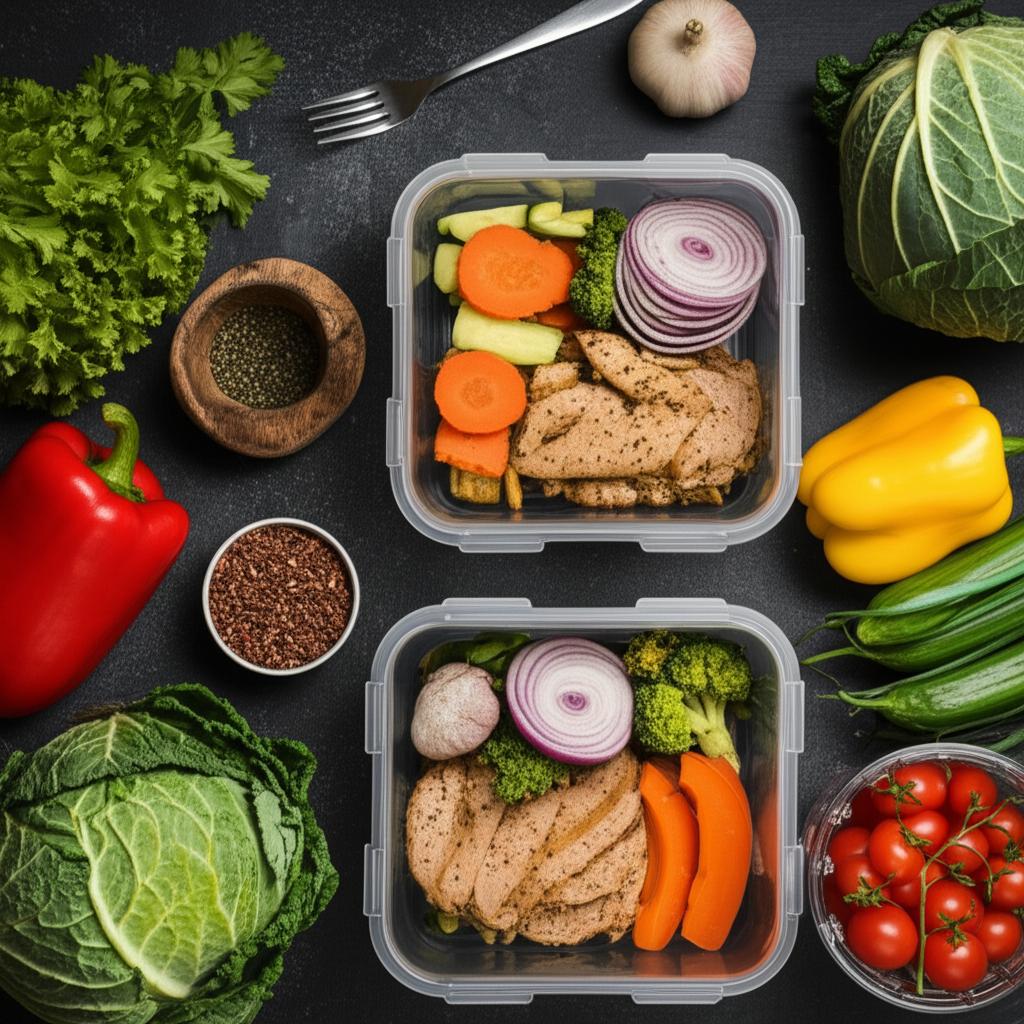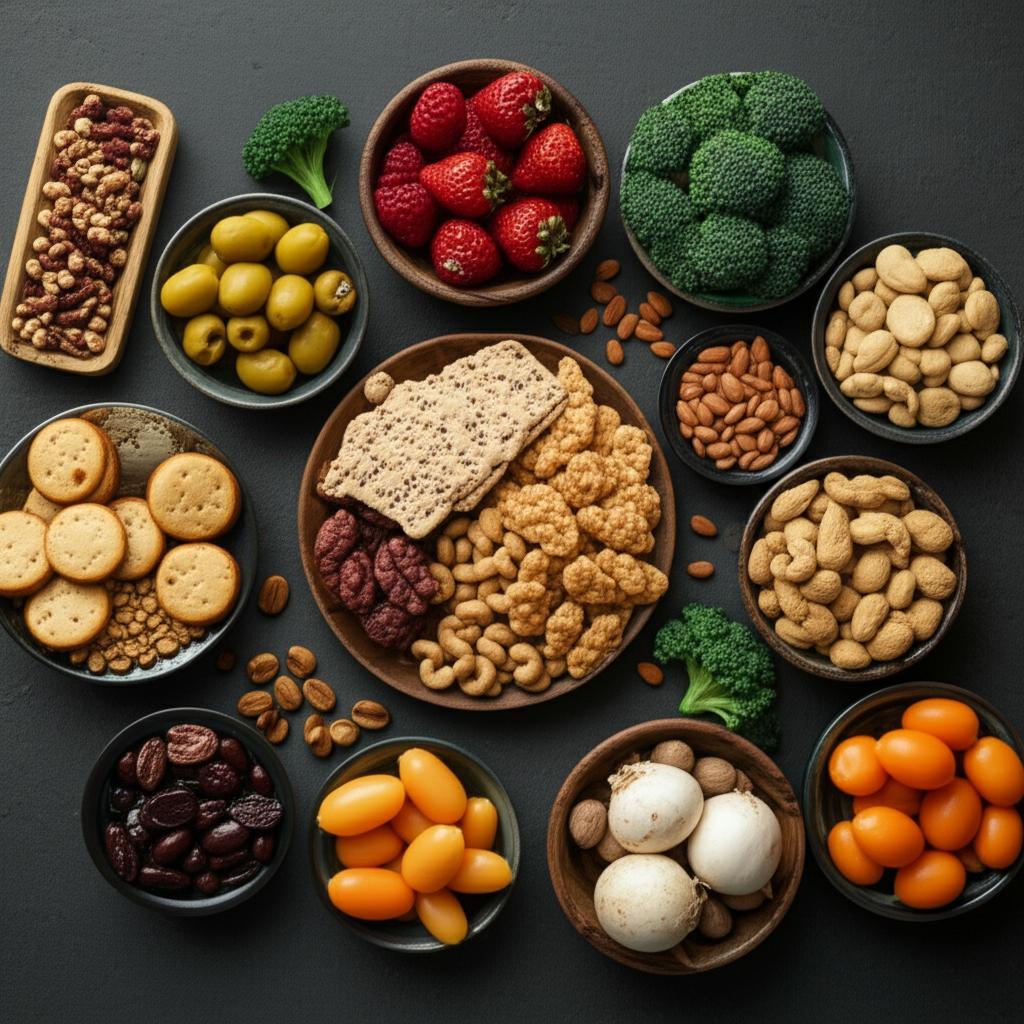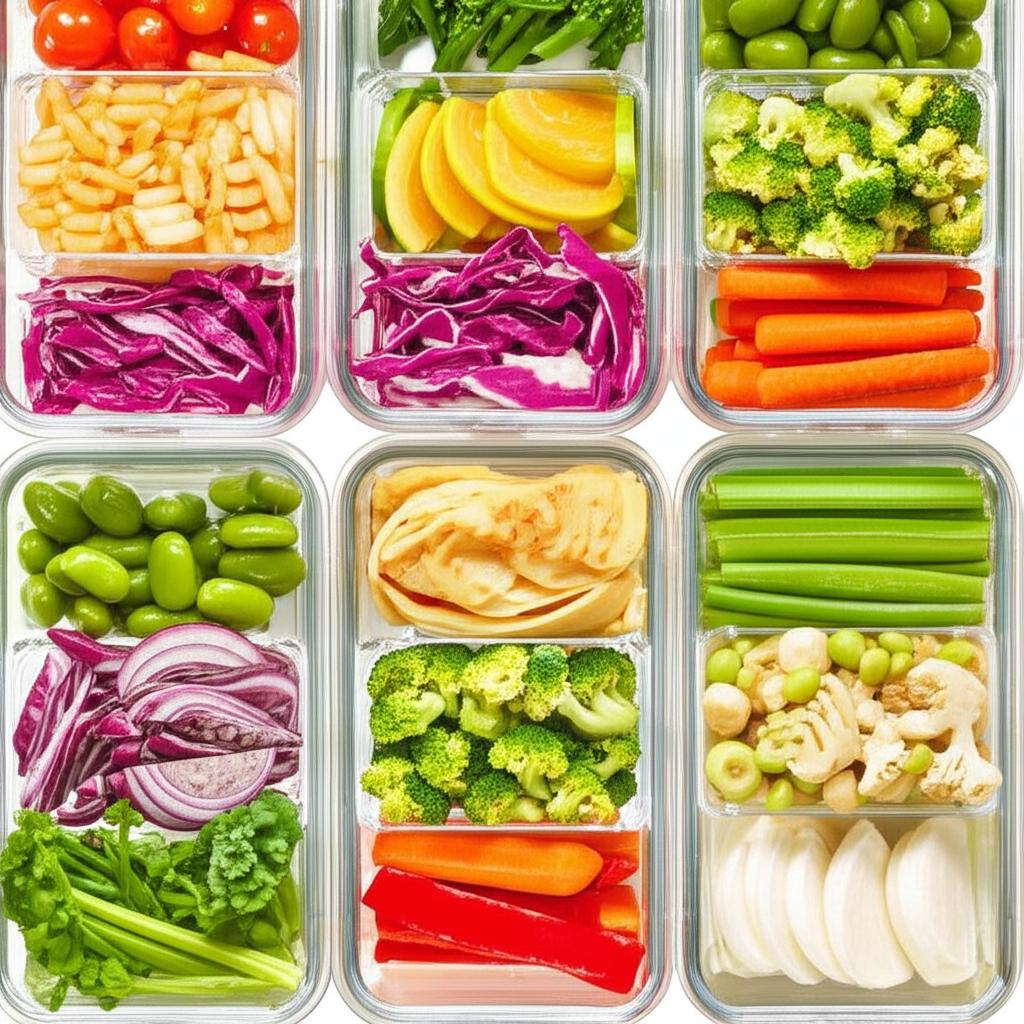
The Beginner’s Guide to Meal Prepping: Your Simple Path to Healthier, Easier Eating
- Dealusy 50 Pack (100-Piece) 24 oz Meal Prep Containers Reusable with Lids, Sturdy Leakproof & Food Safe, Microwave, Freezer, Dishwasher Safe Prep Containers, To Go Take Out Plastic Food Storage
- Dipoo 60 Sets (120-Piece) Deli Containers with Lids, 32/16/8 oz X 20 Set Each, Leak-Proof & BPA Free Airtight Takeout Plastic Food Storage Containers for Soup, Freezer/Microwave/Dishwasher Safe
- Rubbermaid Brilliance Food Storage Containers BPA Free Airtight Lids Ideal for Lunch Meal Prep & Leftovers Set of 5 (3.2 Cup)
Feeling overwhelmed by mealtime decisions? Constantly grabbing takeout or resorting to unhealthy convenience foods because you’re short on time? You’re not alone! Many of us struggle to eat well amidst a busy schedule. But what if there was a simple, empowering solution that could save you time, money, and stress, while boosting your health? Enter meal prepping.
Meal prepping, or food prepping, is simply the act of preparing meals or components of meals in advance, usually for a few days or a week ahead. It’s a fantastic way to take control of your diet, streamline your week, and ensure you always have delicious, healthy options ready to go. And the best part? You don’t need to be a gourmet chef or spend all day in the kitchen to do it! This beginner’s guide will walk you through everything you need to know to start your meal prepping journey with confidence.
Why Should You Start Meal Prepping?
The benefits of incorporating meal prep into your routine are plentiful and impactful:
- Saves Time: Imagine waking up knowing breakfast is ready, or having a healthy lunch packed in minutes. Meal prepping condenses cooking time into one dedicated session, freeing up your weekdays.
- Saves Money: Eating out frequently adds up! By planning and preparing your meals at home, you significantly reduce your food budget. You also minimize food waste by using ingredients efficiently.
- Promotes Healthier Eating: When healthy food is readily available, you’re less likely to reach for unhealthy options. Meal prepping helps you control portion sizes, ingredients, and nutritional content.
- Reduces Stress: No more last-minute dinner scrambles or indecision about what to eat. Meal prep offers peace of mind, making your week smoother and more organized.
- Minimizes Food Waste: Planning helps you buy only what you need, and prepping helps you use up ingredients before they spoil. This is good for your wallet and the planet!
Getting Started: The Essentials for Beginners
Before you dive in, let’s talk about what you’ll need. Don’t worry, you don’t need fancy gadgets or expensive equipment to start. Focus on the basics, and you can always expand later.
- Airtight Containers: These are your best friends! Look for durable, reusable containers that are leak-proof and ideally microwave-safe. Glass containers are excellent for reheating and longevity, while BPA-free plastic can be lighter and more budget-friendly. Having various sizes is helpful for different meal components or full meals.
- Basic Kitchen Tools: You likely already have most of these: sharp knives, cutting boards, large pots and pans, measuring cups and spoons, and mixing bowls.
- A Reliable Refrigerator/Freezer: Ensure you have enough space to store your prepped meals safely.
- A Plan! This is perhaps the most important “tool.” Knowing what you’re going to make is key.
The Step-by-Step Guide to Meal Prepping
Ready to dive in? Here’s a simple, actionable guide to kickstart your meal prepping journey:
Step 1: Plan Your Meals
This is where the magic begins!
* Start Small: Don’t try to prep every single meal for the entire week on your first go. Maybe focus on just lunches for the workday, or a few dinners.
* Choose Simple Recipes: Opt for recipes with fewer ingredients and straightforward instructions. Think about components you can easily mix and match, like a batch of roasted vegetables, a grain, and a protein.
* Consider Your Preferences & Needs: What do you actually enjoy eating? Are there any dietary restrictions or goals? Don’t force yourself to eat foods you dislike, or you won’t stick with it.
* Think About Variety: While simple is good, ensure there’s enough variety to prevent “food fatigue.” You can slightly change seasonings or add different sauces to the same base ingredients throughout the week.
* Factor in Leftovers: Can one dinner recipe become tomorrow’s lunch? This is smart prepping!
Step 2: Create Your Shopping List
Once your meals are planned, it’s time for the list.
* Check Your Pantry First: Before writing anything down, see what ingredients you already have on hand. This prevents duplicate purchases and reduces waste.
* Categorize Your List: Group similar items together (produce, dairy, pantry staples, meat/poultry) to make your grocery trip more efficient.
* Be Specific: Instead of “chicken,” write “2 lbs boneless, skinless chicken breasts.”
Step 3: Go Shopping
With your list in hand, you’re ready to hit the grocery store (or order online!).
* Stick to Your List: This is crucial for saving money and avoiding impulse buys.
* Buy Fresh, Quality Ingredients: Since these meals will last a few days, ensure your produce and proteins are fresh.
Step 4: Prep Day! (The Heart of It All)
Designate a specific day and time for your prep. For many, Sunday afternoon or evening works best.
* Clean As You Go: This will save you a massive cleanup at the end. Keep your sink clear and wipe down surfaces as you work.
* Batch Cook Components: Instead of cooking individual meals, think in components.
* Wash and Chop All Produce: Get all your fruits and vegetables washed, peeled, and chopped for the week. Store them in separate containers.
* Cook Grains: Prepare a large batch of rice, quinoa, farro, or pasta.
* Cook Proteins: Bake chicken breasts, grill salmon, hard-boil eggs, or cook a large batch of ground turkey.
* Roast Vegetables: Toss a variety of your favorite veggies with olive oil and seasonings and roast them all at once.
* Prepare Dressings/Sauces: Make your own salad dressings or sauces in small batches to add flavor later.
* Assemble (or Don’t!):
* For grab-and-go meals like lunches, portion out complete meals into individual containers.
* For dinners, you might prefer to keep components separate and assemble them fresh each night to prevent sogginess. This offers more flexibility.
Step 5: Store & Organize
Proper storage is key to food safety and freshness.
* Cool Food Completely: Never put hot food directly into the refrigerator, as it can raise the fridge temperature and create a breeding ground for bacteria. Let food cool down to room temperature (within two hours) before covering and refrigerating.
* Portion Correctly: Use your airtight containers to portion out individual meals.
* Label and Date: This is a simple but effective step! Use labels or a marker to note what’s in the container and the date it was prepped.
* Refrigerate Promptly: Most prepped meals will last 3-4 days in the refrigerator. Cooked grains and proteins typically last well.
* Utilize Your Freezer: If you’re prepping for more than 4 days, or making larger batches, the freezer is your friend! Many prepped meals freeze beautifully for longer storage (up to 2-3 months), allowing you to pull them out as needed.
Pro Tips for Meal Prepping Success
- Start Simple, Stay Consistent: Don’t try to be perfect on day one. Consistency over perfection is the motto here. Even prepping just one meal type (like lunches) will make a huge difference.
- Batch Cook Staples: Make a big batch of rice, chicken, or roasted vegetables. These can be the building blocks for several different meals.
- Invest in Good Containers: While you don’t need fancy ones, high-quality, durable, stackable containers will make your life much easier and last longer.
- Vary Your Meals (Eventually): Once you’re comfortable with the basics, start experimenting with different recipes and flavor profiles to keep things exciting.
- Don’t Forget Snacks: Prepping healthy snacks (like cut veggies with hummus, fruit, or portioned nuts) can prevent unhealthy cravings between meals.
- Keep It Fun! Put on some music or a podcast while you prep. Think of it as an act of self-care and preparation for a smoother week.
- Utilize Your Freezer: As mentioned, the freezer is a powerful tool. Cook double batches of freezable meals like chili, soups, or casseroles.
- Don’t Be Afraid to Adapt: Life happens! If your plans change, it’s okay. Meal prepping is about making your life easier, not adding more stress.
Common Meal Prepping Mistakes to Avoid
Even with the best intentions, it’s easy to fall into a few traps when you’re starting out. Here are some common mistakes and how to avoid them:
- Overcomplicating Things Too Soon: Trying to make 7 different gourmet meals for the week will lead to burnout. Stick to simple, repeatable components until you’re confident.
- Not Planning Properly: Winging it at the grocery store or in the kitchen will lead to wasted food and time. A solid plan is your foundation.
- Ignoring Food Safety: Not cooling food properly, storing it too long, or not using airtight containers can lead to spoilage and foodborne illness. Food safety is paramount!
- Making Too Much of One Thing: Eating the exact same meal for five days straight can lead to “meal prep fatigue.” Vary your components or seasonings to keep things interesting.
- Forgetting About Snacks and Drinks: Don’t just focus on main meals. Prepping healthy snacks or infused water can keep you on track throughout the day.
- Giving Up After One Try: Your first meal prep session might not be perfect, and that’s okay! Learn from what worked and what didn’t, and keep refining your process. It gets easier with practice.
Ready, Set, Prep!
Meal prepping is a powerful tool for anyone looking to eat healthier, save time and money, and reduce daily stress. It might seem daunting at first, but by starting small, planning effectively, and focusing on simple, delicious ingredients, you’ll quickly discover the joy and freedom it brings.
Embrace the process, learn from each session, and enjoy the incredible benefits of having healthy, homemade meals ready at your fingertips. Happy prepping!
- Dealusy 50 Pack (100-Piece) 24 oz Meal Prep Containers Reusable with Lids, Sturdy Leakproof & Food Safe, Microwave, Freezer, Dishwasher Safe Prep Containers, To Go Take Out Plastic Food Storage
- Dipoo 60 Sets (120-Piece) Deli Containers with Lids, 32/16/8 oz X 20 Set Each, Leak-Proof & BPA Free Airtight Takeout Plastic Food Storage Containers for Soup, Freezer/Microwave/Dishwasher Safe
- Rubbermaid Brilliance Food Storage Containers BPA Free Airtight Lids Ideal for Lunch Meal Prep & Leftovers Set of 5 (3.2 Cup)
FAQ
Q. What exactly is “meal prepping”?
A. Meal prepping is the process of planning and preparing your meals (or parts of them) in advance, typically for several days or an entire week. It involves cooking ingredients, full dishes, or portioning out snacks and meals ahead of time to save time and effort during busy weekdays.
Q. What are the main benefits of meal prepping for a beginner?
A. For beginners, meal prepping offers several key advantages: it saves a significant amount of time during the week, helps you eat healthier by making conscious food choices, reduces food waste, and can often save money by avoiding last-minute takeout or impulse buys. It also reduces daily decision fatigue around food.
Q. How do I start with meal prepping if I’m a complete beginner?
A. Start small! Don’t try to prep every meal for the whole week right away. Begin by choosing one meal, like lunch, and prepping it for 3-4 days. Pick a simple recipe, such as a grain bowl or a chicken and veggie stir-fry. Focus on basic cooking techniques and gradually increase the number of meals or days as you get more comfortable.
Q. What essential equipment do I need for meal prepping?
A. The most essential items are good quality, airtight food storage containers. Glass containers are often preferred for reheating and durability, but BPA-free plastic is also suitable. Beyond that, a good set of knives, cutting boards, and basic pots and pans are generally all you need. A food scale can be helpful for portioning.
Q. How long does prepped food typically stay fresh in the refrigerator?
A. Most prepped meals and cooked ingredients, when stored properly in airtight containers in the refrigerator, will stay fresh for 3 to 5 days. Cooked fish and seafood are best consumed within 1-2 days. For longer storage, many meals can be frozen for up to 3 months, then thawed and reheated.
Q. Won’t I get bored eating the same food all week?
A. Not necessarily! While some people prefer to cook a large batch of one meal, you can easily introduce variety. Consider prepping versatile ingredients like grilled chicken or roasted vegetables that can be combined with different sauces, grains, or spices each day. You can also “component prep” (cook separate ingredients like grains, proteins, and veggies) and mix and match them for different meals throughout the week.
Q. Is meal prepping expensive, or does it save money?
A. Meal prepping is typically more cost-effective than buying individual meals, takeout, or convenience foods. While there’s an initial cost for groceries, buying in bulk, planning your meals around sales, and reducing food waste will significantly lower your overall food budget in the long run. It helps you stick to a grocery list and avoid impulsive purchases.

